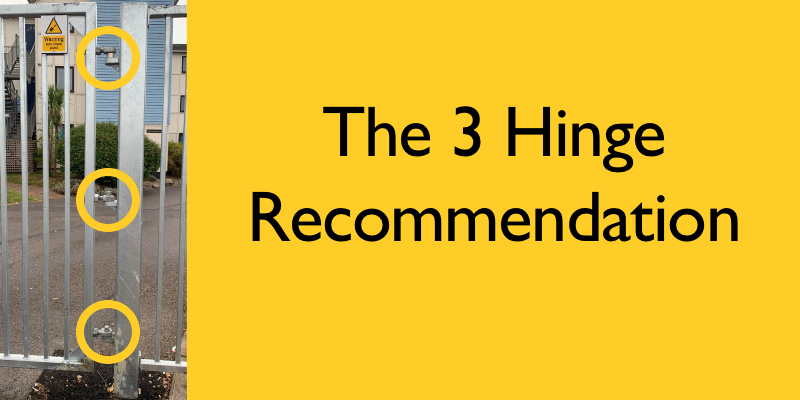As part of its Gate Safety by Design campaign, the charity Gate Safe has recently undertaken an audit of 86 automated swing gates to assess a critical safety issue directly attributed to poor design.
The gates in question were surveyed on request by gate owners who already demonstrated a strong commitment to safety, since they were actively seeking out an independent assessment of the gate to ensure compliance with best practice
Of the 86 gates assessed an overwhelming 63 (75%) featured only two hinges, which is in direct conflict with the guidance provided by the updated British Standard BS EN 12604 which clearly states that all swing gates should be fitted with three hinges.
Of the 63 gates that were found to feature two hinges, a disappointingly low 12 (14%) had received a safety upgrade courtesy of a gate tether, which in the event of a hinge failing, would prevent the gate from falling.
Sadly, the audit revealed that only nine (just over 10%) of the gates reviewed were equipped with the recommended three hinges.
It is likely that the Gate Safe audit represents just a snapshot of the automated gate landscape in the UK – the surveys covered different parts of the country, so it is feasible that there is an exceptionally high number of potentially unsafe gates in the field, with an associated strong risk of another falling gate incident occurring at any time. What is particularly disturbing is that these surveys findings relate to gates where the owner is already demonstrating a strong desire to uphold the required standard of safety. It is worrying to consider what the results are likely to be in instances where there is a more cavalier approach to automated gate safety?
Richard Jackson, Chairman of Gate Safe comments:
“The fact that despite the guidance issued in 2018 via the updated British Standard, so many gates fail to feature the recommended three hinges is disappointing but not entirely surprising. What is more of a concern to us is that so little is being done to retrospectively review these existing gates and when the absence of a third hinge is identified, to mitigate the risk of the gate falling by simply adding a gate tether. This measure costs very little – the average tether is priced under £10 – and from a customer perspective there is no fee associated with installation works – yet we see very few gates with this safety feature. We encourage all installers to take heed of the three hinges recommendation. In the event of an accident, failure to take the appropriate action may result in the installer being accused of creating a gate system that is not fit for purpose, something which the courts will take a dim view of …”
